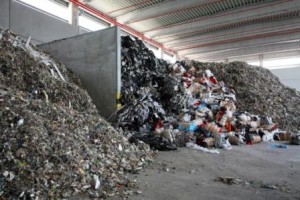 The U.S. Navy is looking to have half of its total fuel use come renewable energy sources by 2020, while the Marine Corps wants those sources, particularly the biofuels, to come from sources near its bases.
The U.S. Navy is looking to have half of its total fuel use come renewable energy sources by 2020, while the Marine Corps wants those sources, particularly the biofuels, to come from sources near its bases.
The New York Times reports that Navy Secretary Ray Mabus wants to dramatically cut the Navy and Marine Corps’ dependence on fossil fuels, especially from sources that might not be so friendly:
“We use in the Navy and Marine Corps almost 1 percent of the energy that America uses,” Mr. Mabus said. “If we can get energy from different places and from different sources, you can flip the line from ‘Field of Dreams’ — ‘If the Navy comes, they will build it.’ If we provide the market, then I think you’ll begin to see the infrastructure being built.”
“Within 10 years, the United States Navy will get one half of all its energy needs, both afloat and onshore, from non-fossil fuel sources,” he added. “America and the Navy rely too much on fossil fuels. It makes the military, in this case our Navy and Marine Corps, far too vulnerable to some sort of disruption.”
 Part of that conversion to renewable sources started last year when the Navy launched its first electric hybrid ship, the Makin Island (pictured right) and more recently when the Navy conducted tests on an F/A-18, dubbed a “Green Hornet,” earlier this year (see my post from April 26, 2010).
Part of that conversion to renewable sources started last year when the Navy launched its first electric hybrid ship, the Makin Island (pictured right) and more recently when the Navy conducted tests on an F/A-18, dubbed a “Green Hornet,” earlier this year (see my post from April 26, 2010).
Meanwhile, Maj. Gen. Carl Jensen, the commander of Marine Corps installations on the East Coast from Florida to Virginia, told ENCToday.com that he believes local farmers will be key to those sources of biofuels:
Jensen said he would like to buy locally produced biofuels to help reach the Marines reach their energy targets. The military is already using some biofuels. In fiscal year 2009, Camp Lejeune used 50,034 gallons of biodiesel and Cherry Point used 43,339 gallons.
Jensen said he’s had discussions with the Defense Energy Supply Center, which provides fuel to the military, about buying more biofuels. Encouraging their production could encourage farming and help curb development potentially harmful to the military, he said.
“We would like to make sure that frankly, skyscrapers aren’t built right next to our bases, or underneath our aviation military training routes,” he said. “It just makes sense.”
 Last year, Powers Energy of America announced that it would build a $254 million waste-to-energy ethanol plant in Schneider, Indiana. According to an article published in the Post-Tribune, the bioethanol plant has received full commitments for funding. In addition to funding this plant, the investors have also now committed to supporting a $75 million solar plant. The solar plant will not be fully completed for five years, but upon completion will produce nearly 100 megawatts of electricity. According to the company, this will be one of the largest solar facilities in the country.
Last year, Powers Energy of America announced that it would build a $254 million waste-to-energy ethanol plant in Schneider, Indiana. According to an article published in the Post-Tribune, the bioethanol plant has received full commitments for funding. In addition to funding this plant, the investors have also now committed to supporting a $75 million solar plant. The solar plant will not be fully completed for five years, but upon completion will produce nearly 100 megawatts of electricity. According to the company, this will be one of the largest solar facilities in the country.





 Recent studies show the significant efficiencies spurred by growth and development in the ethanol industry, according to the
Recent studies show the significant efficiencies spurred by growth and development in the ethanol industry, according to the  “With corn ethanol you also produce an animal feed product simultaneously, to which you have to assign a co-product credit, meaning you subtract the emissions to produce that feed product from the life cycle of corn ethanol,” Steffen explained in an interview. “Now, we’re also looking at other co-products. For example, a lactate which is a solvent that can substitute for petroleum-based solvents in the marketplace.”
“With corn ethanol you also produce an animal feed product simultaneously, to which you have to assign a co-product credit, meaning you subtract the emissions to produce that feed product from the life cycle of corn ethanol,” Steffen explained in an interview. “Now, we’re also looking at other co-products. For example, a lactate which is a solvent that can substitute for petroleum-based solvents in the marketplace.”





